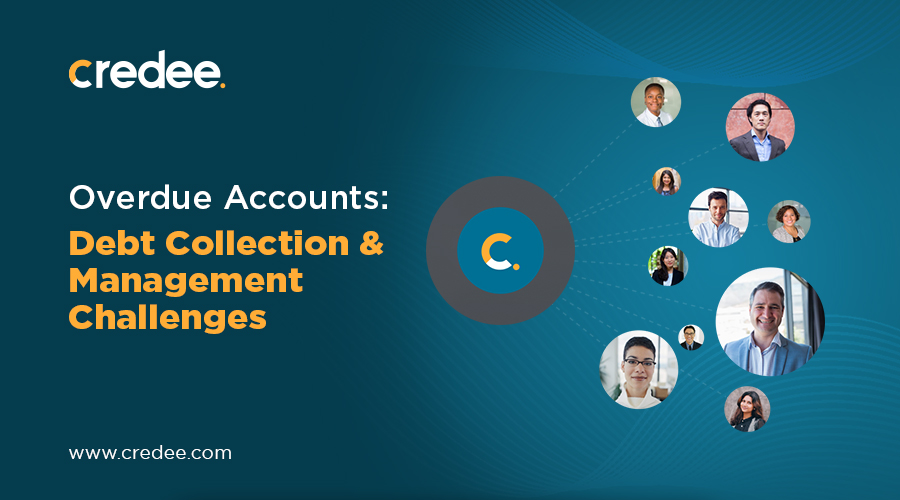
| 42% of businesses in the U.S. struggle with late payments and unpaid account receivables. |
In fact, on average, businesses have to wait 7 to 21 days to receive payments in many cases. It not only impacts revenue but also affects operational efficiency. Most businesses lose 10%–20% of their revenue to bad debt each year as a result. Hence, optimizing revenue and minimizing unpaid invoices are crucial for any business.
The debt recovery process can be challenging, especially if you do not have any debt management software in place. So, dive into this blog as we discuss:
- Top Challenges With Debt Collection Using Traditional Methods
- The Need for Automated Debt Collection Technology
- How Credee Helps Automate Debt Recovery for Businesses
Revolutionizing Revenue Cycle Management with CredeeBill: A Transparent, Economical, and Patient-Friendly Approach
Top Challenges With Debt Collection Using Traditional Methods
Traditionally, many businesses opt for in-house collections, while others may search for “collection agencies near me” and hire external help to handle collections of overdue invoices.
Both methods come with their own advantages & limitations.
1. In-House Collections
Many businesses, especially big organizations with ample debt recovery resources at their disposal, usually opt for in-house collections. It requires hiring a team that handles the unpaid/overdue account receivables without needing an external collection agency.
Advantages:
Dedicated In-House Team:- Businesses benefit from a dedicated team of professionals solely focused on recovering outstanding debts. Hence, they can ensure personalized attention to each account.
Direct Influence Over the Collection Process:- When businesses maintain an in-house team, they enjoy direct control over the debt collection process, unlike when they hire a third-party collection agency.
Better Reputation Management:- Businesses can personalize their approach to align with company policies and values. Hence, minimizing/preventing negative instances while maintaining their reputation.
Limitations/Challenges:
Staff Hiring Required:- Setting up an in-house collections team requires hiring and training staff, which can be more expensive than hiring a collection agency.
Legal Compliance Risks:- In-house collection experts also need to adhere to consumer protection laws such as the Fair Debt Collection Practices Act (FDCPA). Failure to do so can expose the business to legal compliance risks.
Lack of Debt Collection Expertise:- For successful collections, businesses need trained professionals. However, in-house collections teams may lack specialized knowledge and expertise in effectively recovering debts.
Low Success Rate:- Manual collection efforts with in-house teams may often yield lower success rates compared to hiring a specialized agency.
Ineffective Communication:- The collection staff may face challenges due to poor communication skills and a lack of consistent follow-ups. It results in difficulties in recovering outstanding payments.
Needs Highly Organized Strategy and Supervision:- Ensuring effective debt recovery requires a well-organized strategy and supervision. Lack of planning, proper supervision, and ineffective strategies make collection efforts disorganized and less productive. It leads to missed opportunities and wasted resources.

Maximize your earnings by streamlining debt recovery!
Sign Up Now2. Collection Agency
When a customer’s bills are severely past due, most businesses decide to turn over debt recovery to a collection agency. Hence, professional debt collectors oversee the collection while the business can focus on its core business operations.
Advantages:
Less Hassle:- Collection agencies usually take over the entire debt recovery process. Hence, it reduces the hassle of chasing overdue payments for businesses.
Increased Productivity:- With professional debt recovery experts at their side, collection agencies often achieve higher debt recovery rates than in-house collections.
Improved Cashflow:- Collection agencies typically have more experience in successful recoveries, so businesses may enjoy better cash flow than they would with in-house efforts.
Limitations/Challenges:
Expensive:- Typically, collection agencies charge hefty commissions for debt recovery from the amount collected.
For example, suppose a collection agency charges a 20% commission. So, on debt collections under $100, the collection agency's commission would be $20. Hence, it adds to the overall cost of debt recovery for businesses.
No Direct Control:- The collection agency process is usually not transparent, and the business has no control over it.
Unethical Approach:- Despite collection regulations, some collection agencies may engage in illegal or unethical practices. However, businesses usually do not have any say in their approach.
Aggressive Tactics:- Sometimes collection agencies may use aggressive tactics for debt recovery. It can strain customer relationships and may even tarnish the business’s reputation.
No Payment Flexibility:- Most traditional collection agencies may not allow flexible payment options. This makes it difficult for customers to pay back their debt.
Success Rate Varies:- Typically, the success rate of debt recovery using collection agencies is <50%. However, as per the latest statistics, the success rate of debt collection agencies averages around 20–30%.
Difficult Accounts May Be Neglected:- Collection agencies may prioritize easy-to-collect accounts over more challenging ones. Accounts with lower chances of recovery may be neglected, leaving prolonged outstanding debts for businesses.
Collection Agencies Vs. In-House Collections
| Criteria | Collection Agencies | In-House Collections |
|---|---|---|
| Advantages | - Less Hassle - Increased debt collection productivity - Improved cash flow | - Dedicated in-house team - Direct influence and control - Better reputation management |
| Limitations | - Expensive (charges a hefty fee on the collected amount) - Unethical approach - May prioritize easy accounts neglecting difficult accounts - The success rate varies (typically <50%) - Aggressive approach - No payment flexibility - Lack of transparency - No control over the collection agency’s tactics - Impacts reputation based on interaction with the collection agency | - Expensive (staff hiring required) - Legal compliance risks - Lack of debt collection expertise - Low success rate - Ineffective communication - Limited payment options - Needs highly organized strategy and supervision |
The Need For Automated Debt Collection Technology
| 80% of businesses experience a decrease in productivity when using conventional debt collection methods, according to the ACA (Association of Credit and Collection Professionals). |
Manual collections are more time-consuming and resource-intensive. This emphasizes the need for automating the tedious debt collection process. That’s where debt collection software comes to the rescue. For instance, Credee is a payment solution that also allows businesses to automate the debt collection process with its innovative feature – CredeeBill.
How Does CredeeBill Automate Debt Recovery For Businesses?
CredeeBill combines automation with ethical debt collection practices. It not only saves time and effort for your business but also minimizes the risk of straining customer relationships.
It minimizes the need for direct confrontations with customers and fosters positive customer relations. Additionally, by streamlining the follow-up and recovery procedures via CredeeBill, businesses can recover bad debt more effectively while maintaining trust and loyalty.
Additionally, minimizing human confrontations increases the likelihood of successful recoveries. Hence, it allows businesses to recover bad debt faster and more efficiently.
| Advantages Of Automated Debt Recovery With CredeeBill |
|---|
| - The most cost-effective option - Ethical debt recovery - Works tirelessly - Knows when to send reminders - Payment options are available even for difficult accounts - High success rate - Tailored for maximum recovery - No human confrontation - Offers flexible payment options - Complete control with minimum supervision - Fully automated process - No embarrassment for customers - Better reputation management |
Final Thoughts
It’s high time for businesses to adopt a modern approach, like integrating automated software for debt collection. Automating collection processes through debt collection solutions like CredeeBill is ideal for businesses aiming to optimize productivity and preserve customer relationships. Its real-time insights and proactive debt management empower businesses to make informed decisions, enhancing operational efficiency and financial stability.
Reclaim What’s Owed to You With Automated Debt Recovery!
Try CredeeBillFAQs
1. What Is Automated Debt Collection?
It is a streamlined approach to recovering overdue payments using specialized software for debt collection. For instance, CredeeBill is an innovative debt recovery solution by Credee that automates the debt collection process, eliminates manual hassles, and saves the business time, money, and resources.
2. How Does Automated Debt Collection Improve the Efficiency of the Debt Recovery Process?
By integrating automated debt collection technology like CredeeBill, businesses can efficiently manage outstanding debts without the manual burden of following up with individuals. For instance, CredeeBill uses automated reminders and notifications, reducing embarrassment for the customer.
Moreover, it offers flexible payment options that allow customers to settle their outstanding balance in easy installments. As a result, businesses enjoy timely payouts and steady cash flow.
3. Can Automated Debt Collection Solutions Integrate with Existing Financial Systems Used By a Business?
Yes, if you already have a specific financial system in place, such as in-house financing, you can use Credee as an additional resource, and streamline your debt collection without disrupting your existing process. In addition, you can offer payment plans to those who can’t qualify for in-house financing, with no credit check and instant approvals.
Credee has a ‘No Credit Check’ policy that allows businesses to offer on-demand, personalized payment plans to cater to the payment preferences of customers. Hence, it helps enhance the revenue opportunities for the business tremendously.
4. How to Automate the Collection Process?
Most businesses lack the technology to automate the collection process. However, it's much easier than you might think. For this, first, you can sign up for Credee and make a business account. Once your account is set up, you can upload the list of your past-due account receivables and let the automated debt collection software handle the rest.
5. Is CredeeBill Free to Use?
Yes, CredeeBill is an absolutely FREE-to-use feature for Credee users. So, all you need to do is sign up, and you’ll be ready to run your debt recovery on autopilot.
If you need more information, feel free to write to us, or you can book a demo today!



